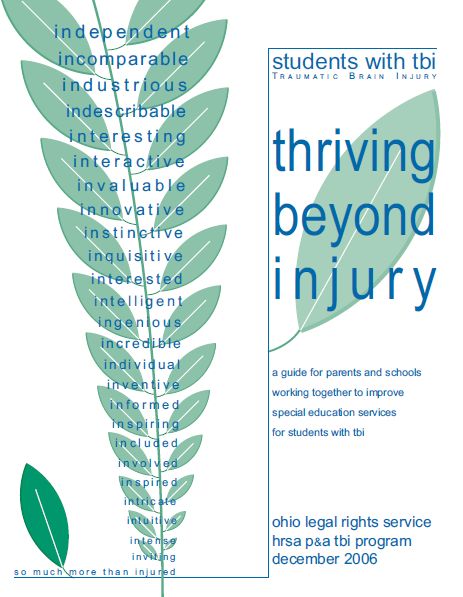Ohio Legal Rights Service:
Resource Empowers Parents and Schools
to Advocate for their Children
Traumatic brain injury (TBI) can impact a child’s brain and break a parent’s heart. However, access to appropriate and effective support services can provide a child with a second chance to thrive, access education, and fully participate in his or her life.
If you have never had a child with a brain injury, how do you know the services, supports, and opportunities that are available? How can you feel confident that you are accessing every avenue for your child? What can you do to contribute to your child’s success?
Ohio Legal Rights created a book called Thriving Beyond Injury to help parents and schools work together to create and execute a support plan for children with a brain injury.
Follow this link – Read: Thriving Beyond Injury
Getting Started – 5 Considerations:
1. Put your brain in a book. Set yourself up for a successful experience. Start by creating a portable work station where you can keep your appointments, notes from meetings, documents, names and contact information, and anything else that will help you organize and manage your mission to support your child. When there is too much to deal with, this tool will keep you going. A really good day timer/calendar can be effective.
2. Ask for support – become informed. If your family has just experienced a tragic event, it may be difficult to read through and make sense of the information in the book. Elicit the help a trusted friend, family member, or social worker to interpret the information you must know and bring you the key points.
3. Gather documentation. Keep a copy of related medical records, insurance, medications, assessments, and anything else that documents what your child is experiencing and how he or she is functioning. During meetings, record the date and take notes on the discussions as well as who said what.
Likewise, keep a daily journal of your child. You could divide it up into morning, afternoon and evening. Comment on your child’s functioning, such as coping skills, behaviors, personality/mood, communication (understanding, expressing self, speech clarity), and level of energy. It might be easier to make a check list or just to talk the information into a voice recorder on your cell phone. Let someone else transcribe it! This information can contribute to your child receiving services.
If your child has returned to school, the teacher should document this as well – especially information relating to the injury’s impact on educational performance. Teachers might notice a change in the following areas, which are included in the definition of a TBI:
…The injuries result in impairments in one or more
areas such as cognition; language; memory; attention;
reasoning; abstract thinking; judgment; problem solving;
sensory, perceptual, and motor abilities; social
behavior; physical functions; information processing; and
speech.
There is a form for teachers to use on page 50 of the book.
4. You may have to start the process. If you are concerned about your child’s performance in school after the injury, request that an evaluation be completed on your child. Your school has a process that happens when an evaluation is requested. Children who are not school age can still receive support through early intervention services.
There are sample letters on page 48 and 49 for parents to use to request help.
Page 66 helps you to understand who to access for children from birth to 2, preschool, and school age children. Pages 109 to 112 provide contact information for supportive agencies.
5. Support today, success tomorrow. If your child requires extra supports at school (i.e. therapy, transportation, accommodations…) that are not already provided, talk to the school about securing them for your child.
You will likely have meetings with the school team to discuss educational goals and future planning. What would you like to see your child experience socially, vocationally, academically, or personally? It could be a tiny task or a big accomplishment. Be sure to communicate this to your child’s team so that programming can encompass today’s needs and tomorrow’s dreams.
What happens if your school does not have a speech-language pathologist?
Speech-language pathologists work with schools and parents to help children move forward following a brain injury.
TinyEYE Therapy Services provides qualified speech-language pathologists to schools who are in need of services.
Our team will be in Ohio from December 4-8th to meet with Special Education Directors about their speech therapy needs and to attend the Ohio Association of Public Charter Schools (OAPCS) annual convention. Please call us at 1-877-846-9393 to set-up a time to meet.
Take care,

![]()
Marnee Brick, MSc
Speech-Language Pathologist and Director of Speech Therapy
TinyEYE Therapy Services (Speech Therapy Telepractice)
Growing smiles, mending spirits, engaging children in their lives…
TinyEYE is the world’s preferred online speech therapy service provider for schools, agencies, and individuals who seek exceptional performance, revolutionary solutions, outstanding service, and student success!


